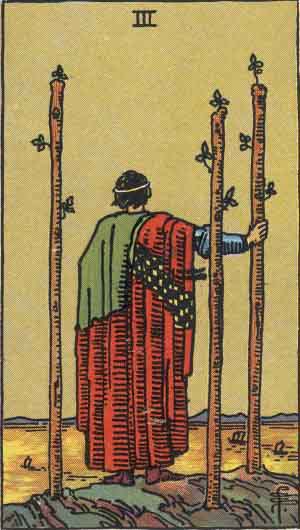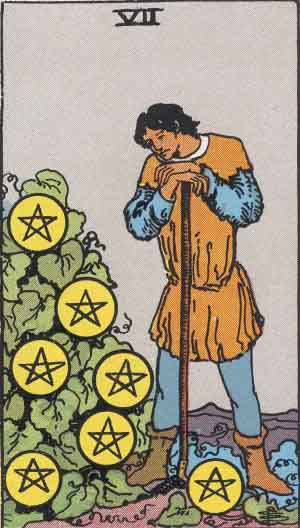In Rabbinical Judaism Chokmah is the "Yesh" which G-d spoke to create Being out of Nothingness: Binah is the Hebrew alphabet which contains, conveys and preserves His message. The 2 of Wands shows a successful campaign and points to what the Querent does. The 3 of Wands illuminates the people and circumstances which made that success possible, the intangible assets and virtues the Querent has. (Strictly business or financial issues are more often covered by the Disks or Pentacles).
Crowley attributed the 3 of Wands to Sol in Aries, the sign of the Spring Equinox. There is a definite feel of springtime to this card. Within its context the 3 of Wands suggests a happy time and a place full of promise. New life is busting out all around the Querent and the last bits of ice are thawing away. The Querent should not be complacent: don't rest on the laurels when they're still tender buds. But the 3 of Wands suggests that advice has already been heard and that if current trends continue there's no need to worry about frost.
Spring is part of the Great Cycle and the 3 of Wands is often a card of revival. Business picks up after a down cycle: an on-again off-again romance is back on. It points to something established, something with deep roots. If the question concerns something or someone new it suggests the potential for a longer, mutually beneficial relationship. 3 is a Saturnian number: while frequently (if accurately) reviled as a harsh taskmaster, Saturn also rules over things which endure and which can pass his test of Time.
 Saturn is also connected to wealth and political power. The 3 of Wands is often associated with commerce and is especially fortunate if the Querent is looking to expand a family business or run for office. Waite referred to the "calm, stately personage" in Pamela Coleman Smith's illustration as a "successful merchant prince... looking from his side towards yours with a view to help you" and suggested the card could signify "able co-operation in business."
Saturn is also connected to wealth and political power. The 3 of Wands is often associated with commerce and is especially fortunate if the Querent is looking to expand a family business or run for office. Waite referred to the "calm, stately personage" in Pamela Coleman Smith's illustration as a "successful merchant prince... looking from his side towards yours with a view to help you" and suggested the card could signify "able co-operation in business."
This is almost always an auspicious card which bodes well for the Querent's undertakings. If it falls in an oppositional position, the 3 of Wands may suggest the Querent is holding boldly to a misguided cause. He may be doing the wrong thing at the right time, or vice versa. But there is still gold amidst the dross. In looking to the surrounding cards, the 3 of Wands is often a beacon pointing to the Querent's strengths and showing how they can be used to best advantage.












